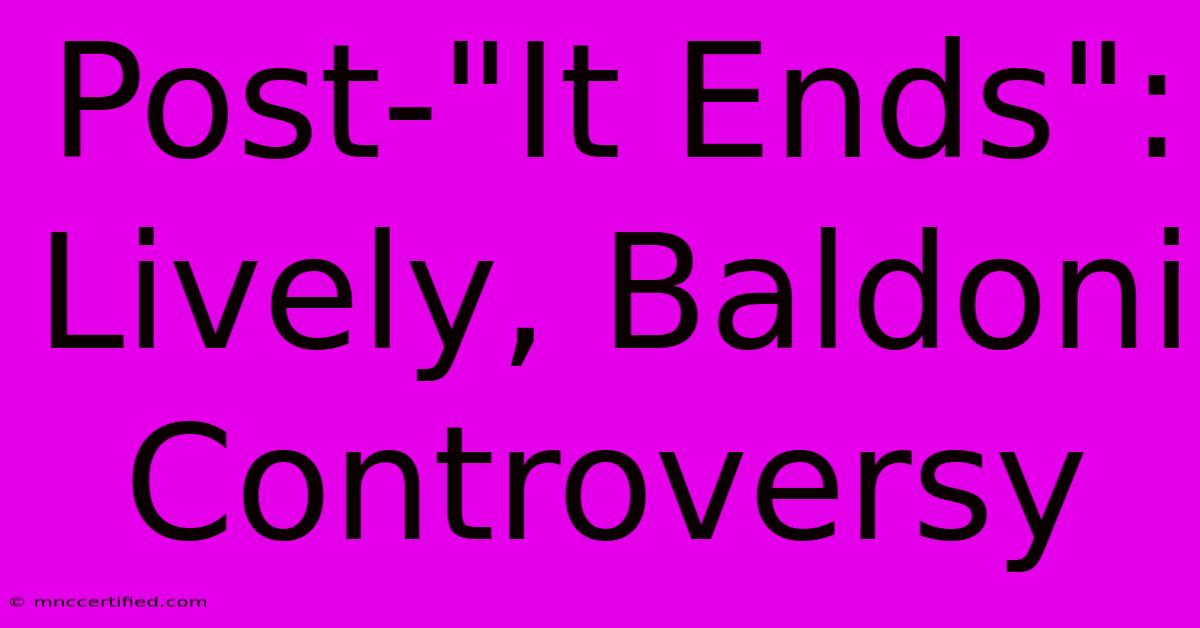Post-"It Ends": Lively, Baldoni Controversy

Table of Contents
Post-"It Ends With Us": The Colleen Hoover and Simone Baldoni Controversy Explained
The release of Colleen Hoover's It Ends With Us ignited a firestorm of popularity, catapulting it to the top of bestseller lists and sparking countless discussions online. However, the novel's success wasn't without its controversies, most notably the fervent debate surrounding author Simone Baldoni's alleged plagiarism accusations. This article dives deep into the Colleen Hoover and Simone Baldoni controversy, exploring the claims, the responses, and the lasting impact on the literary landscape.
The Allegations: A Tale of Two Novels
At the heart of the controversy are striking similarities between Hoover's It Ends With Us and Baldoni's earlier work, The Ex-Husband's Revenge. While neither novel explicitly copies the other verbatim, many readers and critics pointed out parallel plot points, character archetypes, and thematic elements. These similarities include:
- Central Love Interests: Both novels feature a female protagonist falling for a seemingly perfect man who, unbeknownst to her, harbors a dark secret involving domestic abuse.
- Abusive Relationship Dynamics: The depiction of the abusive relationship and its progression, including the cycle of abuse and the victim's struggle to leave, drew significant comparisons.
- Character Traits: The personality traits of key characters, their motivations, and even their names, were flagged as strikingly similar by those analyzing the books.
The Public Response: A Heated Debate
The online community erupted in a flurry of opinions following the surfacing of these parallels. Social media platforms became battlegrounds, with supporters of both authors fiercely defending their favorites.
Pro-Hoover Arguments:
- Coincidence & Tropes: Some argued that the similarities were mere coincidences, reflecting common tropes found within the romance genre. The themes of abusive relationships and finding love are frequently explored.
- Independent Works: Hoover's immense success was highlighted, asserting the originality of her writing style and the emotional impact of her work. Fans emphasized the unique narrative voice and emotional depth in It Ends With Us.
Pro-Baldoni Arguments:
- Substantial Similarities: Supporters of Baldoni emphasized the numerous and significant overlaps between the plot points and character development in both books, arguing that these went beyond simple coincidences or common genre tropes.
- Lack of Acknowledgement: A significant point of contention was the apparent lack of acknowledgment or response from Hoover regarding the accusations. This fueled suspicion and intensified the debate.
Analyzing the Controversy: Copyright and Literary Inspiration
The debate raises critical questions regarding copyright law, inspiration, and the boundaries of originality in literature. While direct plagiarism—copying large portions of text—is clearly illegal, determining where inspiration ends and plagiarism begins is often a complex and subjective matter.
The controversy highlights the inherent challenges in evaluating literary works for similarities, especially within established genres with recurring themes and plot structures. The fine line between homage and infringement remains a crucial topic of discussion.
The Lasting Impact: Lessons Learned
The Colleen Hoover and Simone Baldoni controversy serves as a cautionary tale for authors and publishers. It underscores the importance of thorough research and due diligence to avoid even the appearance of plagiarism. The event also highlights the power of social media in shaping public perception and influencing literary discussions.
Ultimately, the controversy remains unresolved, a testament to the ambiguities inherent in the creative process and the subjective nature of artistic inspiration. It sparked vital conversations about originality, copyright, and the responsibilities of authors and publishers in navigating the increasingly complex digital landscape. It also served as a stark reminder of the power of reader engagement and the potential for online discourse to significantly impact an author’s career and public image.

Thank you for visiting our website wich cover about Post-"It Ends": Lively, Baldoni Controversy. We hope the information provided has been useful to you. Feel free to contact us if you have any questions or need further assistance. See you next time and dont miss to bookmark.
Featured Posts
-
Senate Approves Social Security Fairness
Dec 22, 2024
-
La Liga Barca Atletico Live Stream
Dec 22, 2024
-
Fury Looks Downcast Post Fight
Dec 22, 2024
-
Dubois Calls Out Usyk Post Fury Victory
Dec 22, 2024
-
Baseball Legend Rickey Henderson Dead At 65
Dec 22, 2024